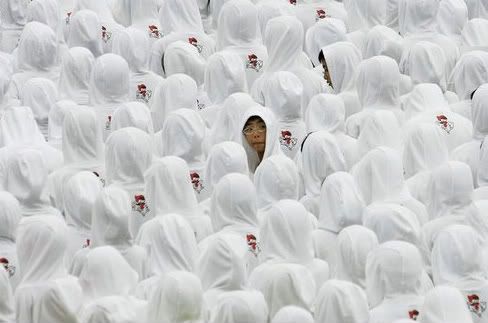
Lin Chi said, "If you can put to rest the mind that frantically seeks from moment to moment, you will be no different from old Shakyamuni Buddha." He wasn't fooling people. Even bodhisattvas of the seventh stage seek Buddha-knowledge without their minds being satisfied:* therefore it is called "affliction." Really there's no way to manage: it's impossible to apply the slightest external measure.
Several years ago there was a certain Layman Hsu who was able to find an opening; he sent me a letter expressing his understanding that said, "Empty and open in my daily activities, there's not a single thing opposing me; finally I realize that all things in the three worlds are fundamentally nonexistent. Truly this is peaqce and happiness, joyful liveliness, having cast it all away." Accordingly, I instructed him with a verse:
Don't be fond of purity:
Purity makes people weary.
Don't be fond of joyful liveliness:
Joyful liveliness makes people crazy.
As water conforms to the vessel,
It accordingly becomes square or round, short or long.
As for casting away or not casting away,
Please think it over more carefully.
The three worlds and myriad things
Are no refuge---where is there any home?
If you are just thus,
This is a great contradiction.
This is to inform Layman Hsu
That his own kin are creating disaster---
Open wide the Eye of the Thousand Sages,
And do not keep praying for relief.
*The Hua Yen Scripture propounds ten stages of bodhisattvahood.
Only with the seventh "Far-Going" stage is the discriminating knowledge
that clings to existence and nonexistence cut off. But at the seventh stage
there's still agent and object, wisdom apart from the truth, and hence accomplishment.
"Though entering the gate of knowledge of contemplating emptiness,
they scrupulously cultivate merit. Though detached from the three worlds,
they adorn the three worlds."
With the eight stage, outward seeking ceases,
and accomplishment is abandoned, even as the Dharma is actualized in this
"Immovable" stage. All the great deeds of benefiting self and others is likened
to what happens when a person dreams of drowning, and generates a
great burst of energy and acts with expedient means to save himself,
and thus by his efforts wakes up. After he awakens, his doings cease.
Swampland Flowers: The Letters and Lectures of Zen Master Ta Hui

Q: How does one deal with the practical life situations
while trying to be simple and experience space?
A: You see, in order to experience open space one also must experience the solidity
of earth, of form. They are interdependent. Often we romanticize open space
and then we fall into traps. As long as we do not romanticize open space as a
wondrous place but rather relate that space to earth, then we will avoid these traps.
Space cannot be experienced without the outline of earth to define it. If we are going
to paint a picture of open space, we must express it in terms of the earth's horizon.
So it is necessary to bring oneself back to the problems of everyday life,
the kitchen-sink problems. That is why the simplicity and precision of everyday
activities is very important. If you perceive open space, you should bring yourself
back to your old, familiar, claustrophobic life-situations and look into them more
closely, examine them, absorb yourself into them, until the absurdity of their solidity
strikes you and you can see their spaciousness as well.
Q: How does one relate to the impatience that accompanies the waiting period?
A: Impatience means that you do not have a complete understanding of the process.
If you see completeness of each action, then you will not be impatient any more.
Q: I experience calm thoughts as well as neurotic thoughts.
Are these calm thoughts something I should cultivate?
A: In the practice of meditation all thoughts are the same: pious thoughts,
very beautiful thoughts, religious thoughts, calm thoughts---they are all still thoughts.
You do not try to cultivate calm thoughts and suppress so-called neurotic thoughts.
This is an interesting point. When we speak of treading the path of dharma,
which is the Fourth Noble Truth, it does not mean that we become religious, calm, good.
Trying to be calm, trying to be good, is also an aspect of striving, of neuroticism.
Religiously inclined thoughts are the watcher, the judge, and confused, worldly
thoughts are the actor, the doer. For instance if you meditate, you might experience
ordinary domestic thoughts and at the same time there is a watcher saying,
"You shouldn't do this, you shouldn't do that, but you should come back to meditation."
These pious thoughts are still thoughts and should not be cultivated.
Cutting Through Spiritual Materialism by Chögyam Trungpa

{Images linked/Programming by DPC}